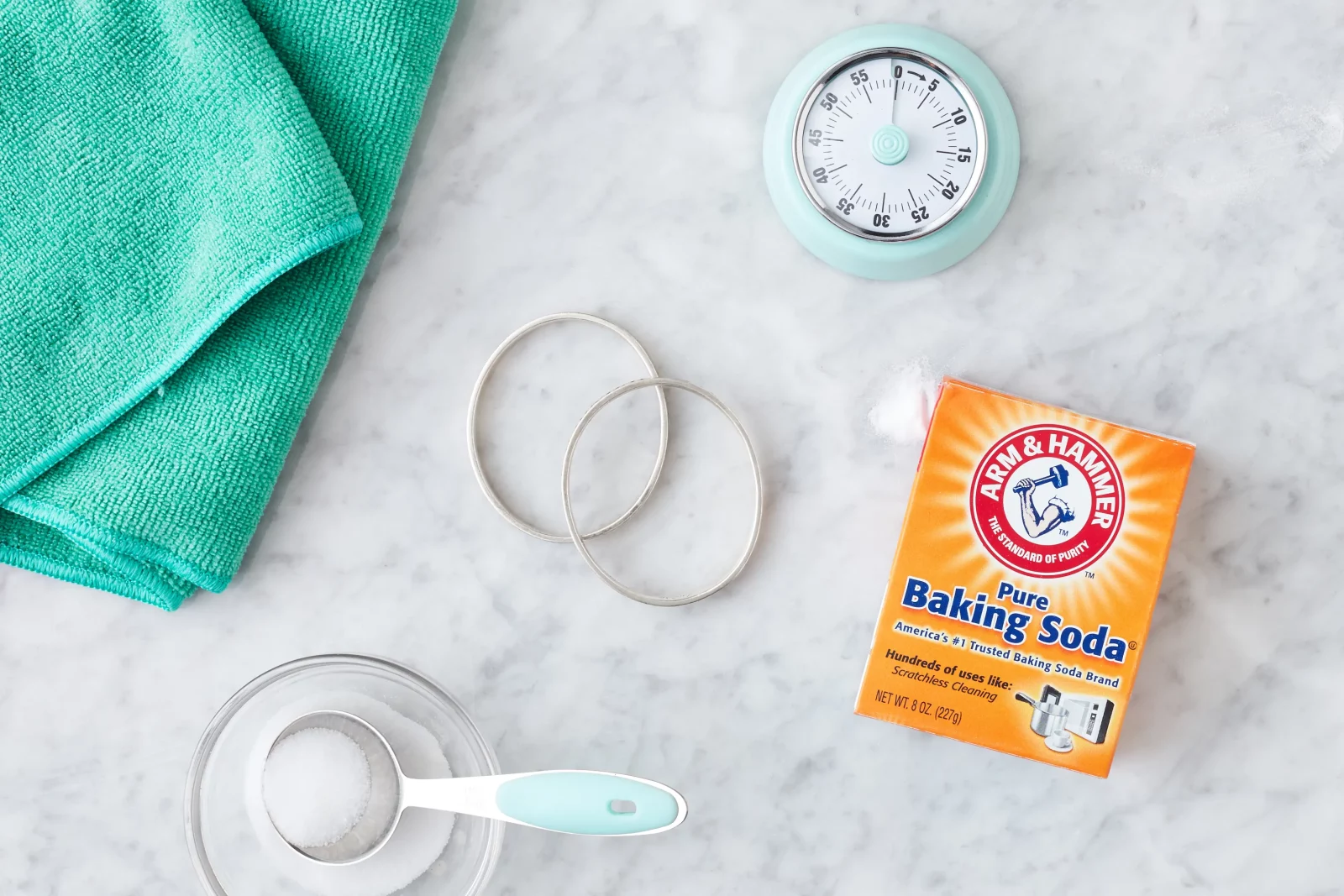This jewellery polishing cloth cleans, shines and protects gold (14k & 18K), silver and platinum items. It also helps prevent tarnish from forming.
It’s impregnated with professional Jewellers Rouge; a compound that cleans and removes tarnish, fingerprints and body oils.
The inner light cloth cleans and the outer darker cloth buffs to a high luster. Non toxic, non abrasive and safe to use.
Silver
Goddard’s Silver Cloths clean and polish tarnished silver jewellery, ornaments, picture frames and hollowware. They are made of soft English cotton that is impregnated with a proprietary blend of cleaning, polishing and anti-tarnish agents. Gently wipe silver or gold and silver-plated jewellery with the cloth to remove light tarnish and buff to produce a brilliant shine.
You can also remove stubborn built-up tarnish with baking soda. Line a bowl with foil, add a few tablespoons of baking soda and some salt then pour boiling water over the silver. Once the black tarnish has dissolved rinse the item(s) and dry thoroughly with a soft cloth.
Keep a jewellery polishing cloth on hand for daily maintenance. Avoid liquid cleaners and electric polishers that may scratch the surface of your jewellery. These cloths are pretreated and contain no abrasives, so they can be used repeatedly if not washed. They are convenient and less expensive than traditional silver dips or polishing compounds.
Gold
A gold jewellery polishing cloth is a quick and easy way to clean and buff your gold jewelry, restoring it to its original luster. The polishing cloth is often impregnated with jeweler’s rouge, a polishing compound that helps remove tarnish and scratches from the jewelry. This cloth is typically made from cotton fiber and is very soft, making it safe to use on even the most delicate pieces of jewelry.
The gold polishing cloth also contains anti-tarnish ingredients that help to prevent oxidation of the metal. This allows the jewelry to maintain its lustrous shine for a longer period of time, reducing the need to polish it frequently. These cleaning cloths can be used on a variety of gold items, including necklaces, bracelets, watches and even silver tableware. The cleaning process is simple: simply rub the polishing cloth over the jewelry and watch it shine! The cloth can be used on both yellow and white gold jewelry.
Platinum
Platinum is a durable and corrosion resistant metal that can be fashioned into fine jewellery pieces. Like all precious metals, it can be subject to some wear and tear over time, including the formation of minor scratches.
Scratches form when harder materials come into contact with the surface of platinum, displacing or removing some of its atoms. When the scratches are minor, a qualified jeweler can polish the piece to restore its luster and eliminate them.
For the best results, we recommend that you clean your platinum jewellery on a regular basis. Mix a solution of mild dish soap and warm water in a bowl and soak your jewelry for a few minutes.
Then, rub the platinum item gently with the jewellery polishing cloth to remove grease and tarnish. The cloth’s inner UltraSoft lighter cloth will remove tarnish and inhibit oxidation while the outer UltraSoft darker cloth buffs and polishes gold or platinum to a high luster.
Rhodium
Rhodium is a rare precious metal found as a by-product of platinum mining. It is used to brighten white gold jewellery, and to provide a durable coating that resists scratching and tarnishing. It is also hypoallergenic and suitable for those with sensitive skin.
Rhodium plating is a process of electroplating, where your jewellery is immersed in a rhodium solution and connected to an electric current to coat it with a thin layer of rhodium. Jewellery makers use a high temperature rhodium bath for up to 3 minutes, and carefully remove and inspect your item between submersions.
It is important to minimize rubbing – especially against other jewellery pieces – because this can cause the rhodium to wear off, revealing the natural colour of the metal beneath. It is also a good idea to take off your rhodium-plated jewellery before using household cleaners, chlorine in pools or any other chemicals that can damage the metal. Similarly, it is recommended to avoid exposing rhodium-plated jewellery to sunlight.






Leave a Reply